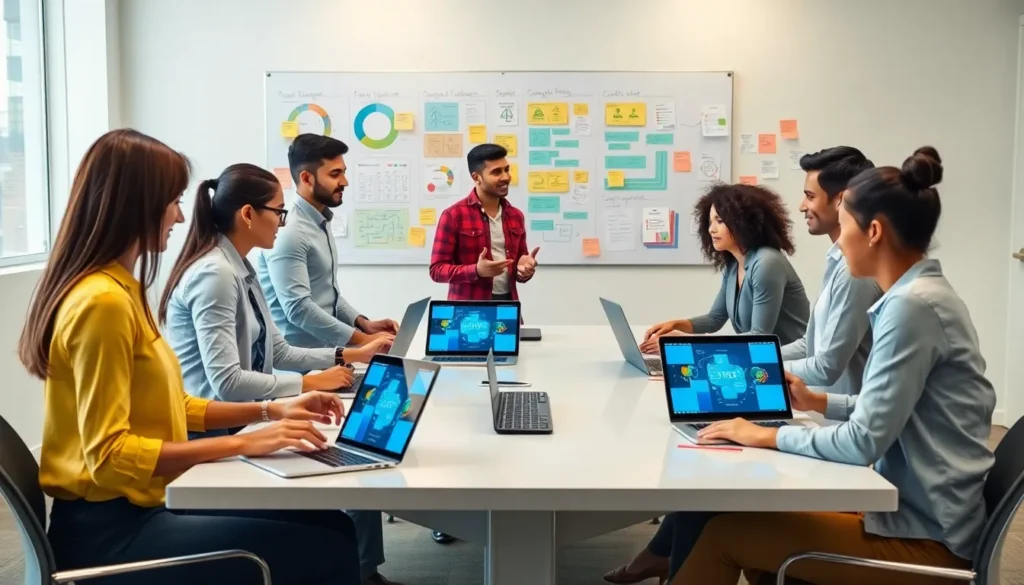Table of Contents
ToggleIn today’s fast-paced world, students are no longer confined to dusty textbooks and cramped library cubicles. Instead, they’ve got a treasure trove of digital resources at their fingertips, ready to transform their learning experience. Imagine having a personal tutor, a vast library, and a study buddy all rolled into one—without the awkward small talk.
From interactive learning platforms to engaging educational apps, these digital tools can make studying feel less like a chore and more like a game. With the right resources, students can tackle complex subjects, ace their exams, and maybe even have a little fun along the way. So, why not dive into the digital realm and discover how these resources can turn academic struggles into triumphs? After all, who wouldn’t want to level up their learning game?
Overview of Digital Resources for Students
Students benefit from various digital resources that significantly enhance their educational experiences. Online learning platforms offer interactive courses that break down complex subjects into understandable segments. Educational apps cater to different learning styles, providing visual aids and quizzes to reinforce knowledge retention.
Many students utilize e-books, which give access to an extensive library without the physical burden of carrying textbooks. Video lectures allow for flexible learning; students can pause, rewind, and digest material at their own pace. Additionally, forums and study groups on social media create supportive environments for discussions and collaboration among peers.
Digital flashcards are effective tools for memorization, helping students to learn key concepts efficiently. Learning management systems streamline course materials and communications between instructors and students. The use of simulations and games in subjects like math and science turns potentially dry topics into engaging experiences.
With resources like MOOCs (Massive Open Online Courses), students can access lessons from top universities at no cost, broadening their educational horizons. Incorporating digital tools also facilitates personalized learning, enabling students to focus on areas needing improvement.
Understanding the advantages of these resources empowers students to take charge of their learning, leading to better academic outcomes. Exploring various platforms encourages students to find what best suits their needs, fostering a more enjoyable and effective educational journey.
Types of Digital Resources
Digital resources provide students with various tools to enhance their learning experience. The following categories highlight some key resources available today.
Online Learning Platforms
Online learning platforms offer interactive courses tailored to various subjects. Platforms like Coursera, Khan Academy, and edX provide students access to lectures from experts. Flexible learning options accommodate different schedules and learning styles. Engaging content often includes videos, quizzes, and hands-on projects to solidify comprehension. These platforms also frequently feature peer reviews and discussion forums, promoting collaborative learning among students.
Educational Apps
Educational apps cater to diverse learning preferences through gamification and visual aids. Apps such as Duolingo for language learning and Quizlet for study aids help reinforce concepts effectively. Many of these applications allow personalized learning experiences that adapt to individual progress. Features such as push notifications can help students stay on track with their study goals. Besides, many apps offer offline access, ensuring learning continues regardless of internet availability.
E-books and Digital Libraries
E-books and digital libraries provide extensive literary resources without the hassle of physical storage. Platforms like Project Gutenberg and Google Books grant students access to thousands of titles and research materials. Extensive search functionalities help users find relevant content quickly. E-books enable features such as highlighting and note-taking, facilitating smooth studying. Digital lending libraries also allow students to borrow books directly from their devices, making resources easily accessible.
Benefits of Using Digital Resources
Digital resources significantly enhance the learning journey for students. They provide diverse tools and methods that cater to various learning styles, making education more engaging and personalized.
Enhancing Learning Experience
Interactive platforms enable students to grasp complex concepts easily. Courses on sites like Coursera and Khan Academy combine visual aids with quizzes, reinforcing knowledge retention. Gamified educational apps, including Duolingo and Quizlet, motivate students through fun elements, fostering consistent engagement. Such resources encourage collaboration among peers, facilitating group studies and discussions. Video lectures allow learners to revisit challenging topics at their own pace, promoting deeper understanding.
Accessibility and Convenience
Digital resources break geographic barriers, granting access to high-quality education from anywhere. Students can tap into extensive libraries through e-books and digital platforms like Project Gutenberg and Google Books, eliminating the need for physical textbooks. Anytime availability makes learning flexible, fitting it seamlessly into busy schedules. Online courses offer various timeframes, enabling learners to balance their academic pursuits with other responsibilities. Whether on a smartphone or laptop, education is more reachable, allowing students to make the most of their learning experiences.
How to Find Quality Digital Resources
Finding quality digital resources requires a strategic approach. Students should prioritize credibility and seek recommendations to ensure valuable content.
Evaluating Credibility
Assessing credibility is essential when selecting digital resources. Start by checking the author’s credentials to ascertain expertise in the subject matter. Look for well-established institutions or organizations behind the resources. Verify the publication date, as updated information enhances relevance. Cross-referencing with reputable sources adds another layer of assurance. Evaluate user reviews, focusing on ratings and feedback from actual users. Trustworthy resources usually feature clear citations and references to reliable research. Use educational platforms recognized for their high standards, such as Coursera and Khan Academy, to enhance the selection process.
Recommendations and Reviews
Consulting recommendations and reviews plays a crucial role in identifying quality resources. Explore user-generated content on forums like Reddit or Quora for diverse insights. Look for reviews on educational websites that specialize in resource evaluations. Platforms like Capterra and G2 aggregate user reviews, offering valuable perspectives on various educational tools. Follow trusted educational blogs that frequently highlight effective resources. Peer recommendations can often lead to discovering lesser-known but impactful tools. Online communities and study groups provide firsthand experiences that simplify decision-making. Embracing collaborative feedback enhances overall resource selection.
Best Digital Resources for Students
Students today rely on various digital resources that significantly enhance their learning journey. From engaging courses to personalized apps, these tools facilitate a better understanding of subjects.
Top Online Tools
Online platforms such as Coursera and Khan Academy stand out for their interactive courses. Users can choose from various subjects, gaining insights from esteemed universities. Through video lectures and quizzes, learning becomes both flexible and engaging. Learning Management Systems streamline communication between instructors and students, fostering collaboration. EdX offers free courses from prestigious institutions, making high-quality education accessible. Each tool provides unique features aimed at simplifying complex topics while catering to diverse learning needs.
Innovative Learning Apps
Educational apps like Duolingo and Quizlet transform study habits through gamification. Duolingo offers fun language learning experiences with bite-sized lessons. Quizlet enhances memorization with digital flashcards and customizable quizzes. Additionally, Evernote helps students organize notes efficiently, while Khan Academy’s app supports studying across devices. By promoting personalized learning experiences, these apps maintain students’ interest and motivate consistent engagement. Each resource enables learners to explore content in ways that fit their unique styles.
Embracing digital resources can transform a student’s learning journey. With a diverse range of tools available students can tailor their education to fit their individual needs and preferences. The interactive nature of online platforms and educational apps not only makes learning more enjoyable but also fosters a deeper understanding of complex subjects.
By exploring and utilizing these resources students can enhance their academic performance and engage with content in innovative ways. The accessibility of quality education through digital means empowers learners to take control of their studies and achieve their goals. Ultimately these tools represent a significant shift in how education is approached and experienced in today’s digital age.










